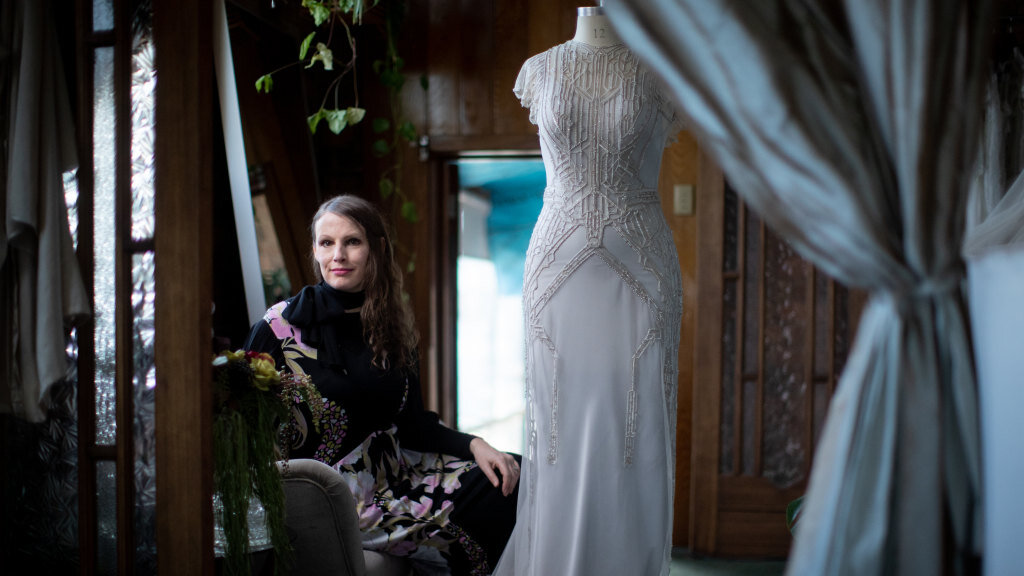NEWS- 'Something old': the growing popularity of the personal wedding dress
'Something old': the growing popularity of the personal wedding dress
written by Julia Naughton
As the bridal industry responds to changing restrictions because of the pandemic, there is one element enjoying a sentimental shift: the wedding dress.
Renewed interest in incorporating "something old" has led to brides opting for a more considered approach, either by looking for a gown that has a story behind it or choosing to rewear or take inspiration from a family heirloom.
Bridal designer Gwendolynne Burkin in her atelier in Fitzroy, Melbourne. CREDIT:SIMON SCHLUTER
Gwendolynne Burkin, who specialises in bridal couture at her namesake atelier in Melbourne, believes couples will make more conservative choices when it comes to their wedding as a result of COVID-19, starting with the dress.
“The next wave of brides won’t want to appear as showy,” says Burkin. “They may have family and friends who have lost a lot of money or lost their jobs and they might feel self-conscious about putting something on when there’s been so much loss and hardship.”
Princess Beatrice wears her grandmother's Norman Hartnell couture gown on her wedding day. CREDIT:INSTAGRAM/THEROYALFAMILY
It’s a universal feeling that extends to the rigid world of royalty.
Princess Beatrice wears her grandmother's Norman Hartnell couture gown on her wedding day. CREDIT:INSTAGRAM/THEROYALFAMILY
Princess Beatrice's vintage wedding dress, first worn by the Queen in the '60s, struck a chord at a time when global unemployment surges and the coronavirus continues to wreak havoc around the world. It was reminiscent of the Queen’s wedding gown choice, also designed by Norman Hartnell, which was paid for with ration coupons in post-war Britain.
While not everyone has an archive of couture gowns in the family, the desire to recognise history when choosing a wedding dress has been gaining popularity for some time, says Paul Vasileff, founder and head designer at Paolo Sebastian.
“We’ve had people asking us to sew little trinkets or parts of their grandmother or mother’s dress into their dress,” says Vasileff. “I had someone bring in a handkerchief from their grandmother and we actually took the artwork from the flowers that were used and created their embroidery from there.”
“Mum kept it wrapped in paper for many years, it's in impeccable condition,” she says, adding that she worked with Melbourne bridal designer Sonia Cappellazzo to alter it to size.
“It was a really special thing for me,” says Bartholomew. “I was very close with my grandmother; I went to boarding school in Sydney and spent a lot of time with her.”
Edwina Bartholomew's grandmother, Millicent Halley, on her wedding day in 1944.
As for whether she hopes her own daughter, Molly, whom she welcomed with husband Neil Varcoe in December, will choose to wear it on her wedding day?
“Gosh, who knows what the fashion will be in 30 years' time or whenever she – if she – decides to get married,” she says. “There was certainly no pressure for any of us.”
For those without access to a family keepsake but who are wanting to purchase a vintage dress, look for inspiration at Melbourne's National Trust that has a collection of more than 5000 gowns spanning from the 1820s to the mid 20th century.
“They arrive with such fascinating stories,” says the Trust's Elizabeth Anya-Petrivna. “Especially, after having multiple owners and adaptations.”
Edwina Bartholomew's grandmother, Millicent Halley, on her wedding day in 1944.
“My clients are not interested in purchasing the mass dresses available online that aren’t fitted to you and aren't heirloom pieces,” she says.
At one point she was creating up to 170 custom gowns a year, but she has recently changed direction with a sustainable clothing collection, including evening wear for her bridal clients as she adapts to changing consumer demands.
Burkin is one of eight recipients of the Victorian government’s Sustaining Creative Workers program that has allocated $4.7 million to individuals and organisations to help them meet the challenges of the pandemic.
“Victoria is home to an incredible fashion community but, like others across our creative industries, fashion and design businesses have been hit hard,” says Martin Foley, Minister for Creative Industries. “Many of our local designers and labels are using this time to reframe their businesses and are showing extraordinary determination, resilience and adaptability.”
The total number of recipients of the Sustaining Creative Workers funding is 770 individuals and micro-businesses. Burkin, Yeojin Bae and Brunswick-based label Strateas Carlucci all received $10,000 grants for their projects.
See the full article here in Sydney Morning Herald
Designer Gwendolynne Burkin in her atelier Photo SIMON SCHUTER



